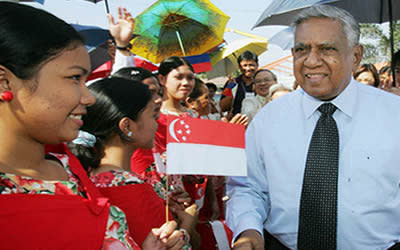What does the President do?

By P N Balji
The recent flurry of statements on what the President cannot do throws open a most unusual question, that too 20 years after the office of Elected Presidency was created: So, what can he do?
We have seen a minister, an ex-minister and the President himself talking about the role and responsibilities of Singapore's most important person, by protocol that is, 21 years after the office of Elected President came into being.
He has no centre of power (Prof S Jayakumar), cannot make policies (K Shanmugam) and is tied down by the Constitution (S R Nathan). Even his power over the country's reserves and senior civil service appointments were curtailed in 1990 when a change in the law dictated that Parliament can override a presidential veto on reserves or key public service appointments with a two-thirds majority if the President did not accept the advice of his advisers.
So, what does the President actually do?
Nothing very much, it might seem from information available in the public domain. In the case of Mr Nathan, two items on his official schedule stand out: His overseas trips and his attendances at many social, charity and community events. Both are important for a country that needs to have an acute understanding of the thinking of world leaders and to show official support for worthy causes.
Mr Nathan seems to realise that the President's duties are not well understood. He said at a press conference after a visit to Mauritius last week: "Although I have been quiet, I have been doing work."
To fill the gap between perception and reality, Mr Nathan said he will reveal everything -- "warts and all" - in his memoirs which will be out in September.
That book will be useful in another aspect: whether the role of the President should be redefined. He said he will share his thoughts on that.
So, what should the President do?
First, he needs to show to people what kind of work he has done. A yearly report card of his work - in the social/community sphere, his foreign visits, his charity drives, his thinking on civil service appointments -- will be useful.
Second, he needs to be out there giving his thoughts and views on issues of the day. An annual speech where he sets out what he sees as the big issues that Singaporeans should take note of -- like the PM's National Day rally speech -- will go some way in reducing the perception gap.
Third, he needs, to champion a cause, especially in the social/community sector. One readily comes to mind: the growing gap between the haves and the have-nots.
The timing is right for a more high-profile President. Singapore society is being torn and polarised as the government turbo-charges its way into a new world filled with uncertainities and different political and economic centres of power emerging.
In such a complex world, nobody has the right answers all the time. A President's objective and calming voice can go some way to provide another avenue for discussion, debate and even disagreement.
As the concept of Elected Presidency enters its 21st year, how the next President behaves and acts will show to Singaporeans that their money is being thrown at the right person and for the right cause.
This is what the coming presidential elections must be all about. We need a President who is not just a guardian of our reserves but also a guardian angel of our national consciousness.
P N Balji is the director of the Asia Jouralism Fellowship, a joint initiative of Temasek Foundation and Nanyang Technological University.

